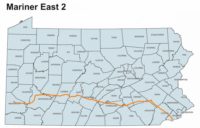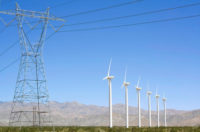Energy Transfer Pipeline June 21 Hearing Set on Criminal Charges

A June 21 preliminary hearing is set in a Pennsylvania court related to 48 criminal charges filed last year against pipeline builder Energy Transfer for allegedly allowing thousands of gallons of drilling fluid to escape, on repeated occasions, during construction of the $2.5-billion Mariner East 2 natural gas liquids pipeline.
The hearing date was confirmed by a spokesperson for state Attorney General Josh Shapiro, who filed the charges last October, based on grand jury recommendations.
The 350-mile-long twin 16-in. and 20-in. line across 17 counties in southern Pennsylvania was completed and commissioned earlier this year. Energy Transfer is the successor of Sunoco Pipeline, the original pipeline developer.
The Mariner 2 East line is designed to carry propane, ethane and butane from the Marcellus Shale and Utica Shale natural gas fields to a refinery and export terminal in Marcus Hook, south of Philadelphia, on the Delaware River.
During directional drilling, Energy Transfer used drilling fluids that contain unapproved additives that spilled into the groundwater and often surfaced in fields, backyards, streams, lakes, wetlands and drinking water wells, that were never reported to the state environmental officials, Shapiro said.
Mariner East has been fined more than $20 million for at least 120 violations.
Energy Transfer did not respond to an ENR query.
In a May 4 first-quarter results call with analysts, a company executive noted “an uptick in volumes through the pipelines,” adding that the firm “expects to see incremental revenue and volume growth for the remainder of the year.” Company executives also noted gas supply in "sufficient volumes for another ethane expansion at Marcus Hook." A decision will be made "over the coming weeks, but we certainly expect over the next year or two to be expanding Marcus Hook in a big way.” Energy Transfer executives said the "East Coast absolutely will play a larger role in providing energy security for Europe.”
In a related action, a state administrative law judge ruled June 6 that, in a complaint to the state Dept. of Environmental Protection by two landowners against Energy Transfer, the plaintiffs could not call as expert witnesses, two technical managers at consulting firm ARM Group Enterprises Inc., Hershey, Pa.
The judge said the firm executives, Andrew Reese, described in his LinkedIn profile as a senior scientist and project manager, and William Seaton, described as senior hydrogeologist, could not testify because of a conflict of interest. ARM Group, which ranks among ENR's Top 500 Design Firms, has served since 2015 as a state DEP consultant, providing “extensive, ongoing confidential consulting services” during its required oversight of Mariner East 2 construction, Judge Bernard Labuskes said.
In a six-page order, he said ARM Group “would simultaneously be providing consulting services for [the state] regarding the Mariner East pipelines, and testifying against [it] on behalf of adverse landowners.”
ARM Group contracted to help DEP with administrative and field geotechnical support and evaluation necessary for agency permitting and compliance investigations of horizontal directional drilling sites and activities throughout Pennsylvania. This included issues related to Sunoco’s construction of the Mariner East pipelines, “such as … identifying damages from that activity and how to remediate when damages were found,” Judge Labuskes said.
ARM Group has obtained extensive information from Sunoco related to the Mariner East pipelines and other pipeline assets in the state, the opinion said, although noting that firm employees have testified on behalf of DEP and served as expert witnesses in other appeals related to drilling issues on the Mariner East pipelines.
But the judge said DEP’s extensive interactions with ARM Group related to investigations of drilling fluid releases at Mariner East 2 are the same kind of issues involved in this case, in which landowners claim that Sunoco’s horizontal directional drilling damaged their properties. Labuskes said that this particular situation is troubling because ARM Group continues to serve as the state’s consultant. He called the conflict of interest “obvious.”
ARM Group did not respond to ENR’s request for comment by press time.




